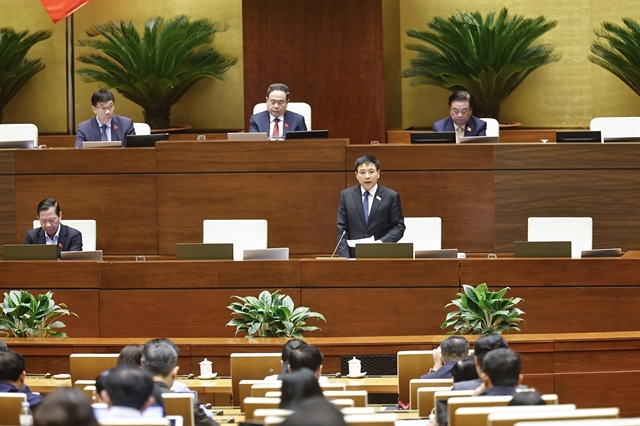 Politics & Law
Politics & Law


|
| Minister of Finance Nguyễn Văn Thắng responds to lawmakers and clarifies several points raised during the session. — VNA/VNS Photos Doãn Tấn |
HÀ NỘI — The National Assembly devoted its morning session yesterday to examining proposed amendments to the Law on Public Debt Management, with deputies welcoming efforts to tighten oversight and modernise the legal framework.
Greater transparency
Legislators agreed that the revisions come at an important moment as Việt Nam seeks to reinforce fiscal discipline, improve the management of public borrowing and meet the demands of international economic integration.
The draft law introduces clearer rules for the negotiation, signing and administration of ODA and concessional loans and places greater emphasis on transparency throughout the borrowing and repayment process.
One debated element concerned how Government debt obligations should be treated. Several deputies, including Tô Ái Vang of Cần Thơ City, said that the law must guarantee consistent and fair treatment of all obligations. She argued that such a principle reflects the Government’s commitment to honouring its debts responsibly and is a benchmark that international credit rating agencies use when assessing a country’s debt profile.
Embedding this commitment in the law would support Việt Nam’s efforts to raise capital more effectively in future, she said.
Even so, she and other legislators urged the drafters to make additional improvements. These include clearer requirements for the Ministry of Finance and related bodies to disclose information about borrowing, disbursement and repayment in a timely and comprehensive manner and detailed rules on how exceptional situations, such as urgent borrowing to safeguard national financial security, should be handled.
Deputy Nguyễn Tâm Hùng from HCM City said the idea of consistent treatment must be accompanied by clear classifications of different types of debt, given that obligations vary in their terms, levels of priority and the presence or absence of Government guarantees. Without such clarity, disputes could arise when the market is turbulent.

|
| NA deputy Nguyễn Tâm Hùng speaks during the session. |
He also emphasised the need for strict deadlines and standardised reporting formats in reconciling debt data between ministries, agencies and provincial administrations. Persistent delays at the local level have repeatedly slowed the compilation of nationwide public debt reports.
He urged the inclusion of a requirement to assess the project management capacity of agencies seeking ODA or concessional loans. Many proposals come from localities lacking sufficient experience, resulting in slow disbursement and cost overruns. Including such an assessment in Article 29 would help filter out weak projects and mitigate public debt risks.
A stronger legal framework
Minister of Finance Nguyễn Văn Thắng told lawmakers that the draft law revises 23 of the existing 63 articles, aiming to deepen decentralisation, reduce administrative procedures, harmonise the legislation with other major laws and remove longstanding obstacles in accessing foreign loans.
He said the drafting process involved close coordination with the Ministry of Foreign Affairs to ensure that procedures for negotiating and adjusting ODA and concessional loans are consistent across legal documents. The revised law focuses on clarifying negotiating authority and cutting intermediary steps, with detailed procedures to be laid out in Government decrees rather than the law itself.
The amendments also retain existing principles on re-lending to localities and public service units, while introducing new flexibility by allowing grant-based allocations in certain cases. The Government would determine when ODA and concessional loans may be allocated directly to localities based on management needs.
For public service units in priority sectors such as education, science-technology and innovation – as defined in Party Resolutions 57-NQ/TW and 71-NQ/TW – the draft would allow grant-based allocations for units that have not yet achieved financial autonomy.
Other projects would continue under partial re-lending arrangements to avoid dependency and ensure repayment responsibilities are shared appropriately with the State budget. — VNS




